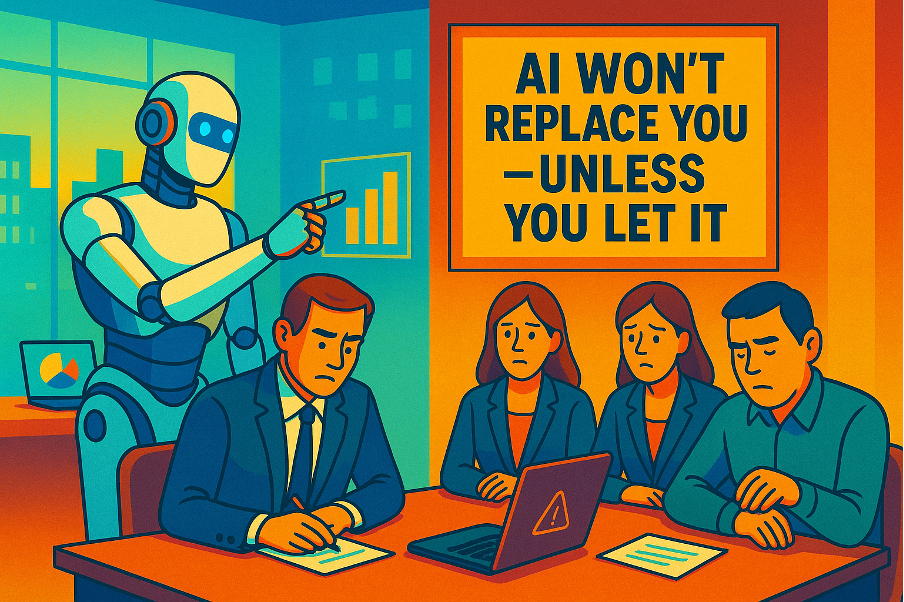Will AI Replace Your Job? Maybe Not. But Ignoring It Definitely Will.
There’s no shortage of noise about AI these days — job losses, automation, ChatGPT, and the growing fear that machines will make humans obsolete.
But let’s get honest: the real threat isn’t AI. It’s complacency.
AI isn’t going away. It’s not a passing trend — it’s a permanent fixture of the modern workplace, evolving at a pace that’s rewriting job scopes and business models across sectors. Just like the internet revolution of the early 2000s, AI is shifting the way we work, live, and compete. But here’s the truth: AI won’t replace you — unless you let it.
The Human Edge is Still Real — But You Need to Use It
Machines are brilliant at crunching data, automating workflows, and scaling repetitive tasks. But they still fall short in areas where humans shine: critical thinking, empathy, judgment, creativity, adaptability. These are not “soft skills” anymore — they are survival skills.
To stay relevant in an AI-integrated workplace, we need to do more than “upskill” in the technical sense. We need to rethink what it means to be human at work. The professionals who thrive will be the ones who can collaborate with AI, not compete against it.
The Two Types of Professionals Today
A mentor once told me, “There are two kinds of people — those who shape their destiny, and those who let destiny shape them.” This applies now more than ever.
AI will reshape industries. Roles will be redesigned. Skill demands will shift. Those who wait for their job descriptions to be rewritten for them will fall behind. Those who take ownership of their career direction now — auditing their skills, anticipating change, adapting fast — will lead the way.
In Singapore, PMETs are already feeling the heat. A 2024 survey by Indeed and Censuswide revealed that only 53% of workers said they were willing to upskill in AI to stay relevant.
The gap between knowing and doing is real — and risky. As AI continues to reshape industries, those who act early will have the edge. Those who wait may find their roles evolving without them.
https://www.peoplemattersglobal.com/news/skilling/is-singapore-falling-behind-in-ai-upskilling-43434
So, What Can You Do Now?
Here’s a clear, practical checklist to start future-proofing your career:
- Understand how AI is impacting your industry and function.
Read, attend webinars, follow thought leaders. Stay in the loop — not the dark. - Identify tasks in your job that are ripe for automation.
Ask yourself: “If AI could do this part of my job, what would be left for me to focus on?” - Evaluate your unique human strengths.
Are you bringing value through communication, problem-solving, leadership, or innovation? - Do a career health check.
What are the skill gaps? What roles in your industry are growing, and how do your skills stack up? - Build a continuous learning plan.
Not just for technical skills — but for strategic thinking, emotional intelligence, and adaptability. - Speak to a career coach or mentor.
Sometimes you need a second pair of eyes to unpack where you’re headed and how to get there.
Final Word
This is not about fear. It’s about clarity and action. The professionals who thrive in the age of AI will not be the most technical — but the most proactive.
The future of work is not AI versus humans. It’s AI with humans who know how to evolve.
A Practical Way to Get Started — With Support
If you’re not sure where to begin, Polaris by AKG is a great starting point. It’s a career coaching and planning programme subsidised by Workforce Singapore (WSG) that helps professionals assess their current career status, identify skill gaps, explore new pathways, and develop a forward-looking career strategy.
Through Polaris, you’ll gain structured guidance and actionable plans — not just vague advice. And with the support of certified coaches who understand the demands of the Singapore workforce, you won’t be navigating the future alone.
Contributor:
Evelyn Chua
Certified Career Coach & Observer
